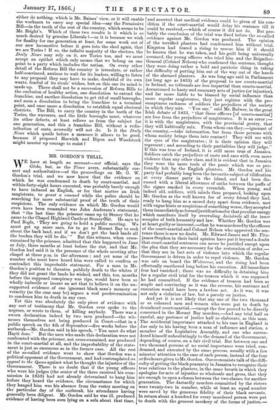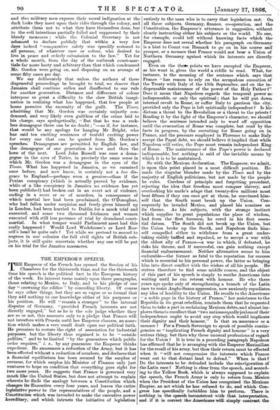MR. GORDON'S TRIAL.
WE have at length an account—not official, says the Globe, but, as the Times avers, substantially cor- rect and authoritative—of the proceedings on Mr. G. W. Gordon's trial, and we now know that the evidence on which he was condemned to death by court-martial, and within forty-eight hours executed, was probably barely enough to have induced an English, or for that matter an Irish magistrate, to grant a remand while the police should be searching for more substantial proof of the truth of their suspicions. The only evidence on which Mr. Gordon would even have been remanded was John Anderson's statement, that "the last time the prisoner came up tg■Stoney Gut he /same to the Chapel Highland Castle at Stoneyarit. He soya to Paul Bogle, They are going to hold a public meeting. We must get up more men, for to go to Morant Bay to seek about, the back land, and if we don't get the back lands all the buckra. they will be die.' " But this witness, when cross- examined by the prisoner, admitted that this happened in June or July, three months at least before the riot, and that Mr. Gordon had said it in the presence of the whole meeting after chapel at three p.m. in the afternoon ; and yet none of the number who must have heard him were called to confirm or contradict this improbable statement. For a man in Mr. Gordon's position to threaten publicly death to the whites if they did not grant the lands he wished, and this, too, months before the supposed conspiracy was ripe, would have been so wholly imbecile or insane an act that to believe it on the un- supported evidence, of one ignorant black man's memory or veracity (as the case may be) argues a real predetermination to condemn him te_death in any case.
Yet this was absolutely the only piece of evidence with any sort of testimony that Mr. Gordon ever spoke to the negroes, or wrote to them, of killing anybody. There was a sworn declaration indeed by two men produced—the wit- nesses themselves not being produced in Court—that in a public speech on the 4th of September—five weeks before the outbreak—Mr. Gordon said in his speech, " You must do what Hayti does." But the men who made this declaration were not confronted with the prisoner, not cross-examined, nor produced in the court-martial at all, and the improbability of the state- ment is just as enormous as in the former case. All the rest of the so-called evidence went to show that Gordon was a political opponent of the Government, and had contemplated an appeal to the Queen against what he thought the injustice of the Government. There is no doubt that if the young officers who were his judges (the senior of the three received his com- mission in 1859) had not already determined to hang him before they heard the evidence, the circumstance for which they hanged him was his absence from the vestry meeting on the particular day of the outbreak, his attendance having generally been diligent. Mr. Gordon said he was ill, produced evidence of having been seen lying on a sofa about that time,
and asserted that medical evidence could be given of his con- dition if the court-martial would delay his sentence till it could be received,—which of course it did not do. But pro- bably the conclusion of the trial was fixed before the so-called evidence against Mr. Gordon was produced. The opinion of the terrified planters had condemned him without trial. Kingston had feared a rising to rescue him if it should be known that he was taken, and his guilt being universally assumed, the young officers who tried him and the Brigadier- General (Colonel Nelson) who confirmed the sentence, thought they were doing rather a bold and patriotic thing in taking the difficulty of putting him out of the way out of the hands of the alarmed planters. As was long ago said in Parliament (as long ago as 1833) of the proposal to use courts-martial in Ireland, no tribunals are less impartial than courts-martial. Accustomed to hasty and summary acts of justice (or injustice), and far more liable to be biassed by social influence than more regular magistrates, they just register with the pre- sumptuous rashness of soldiers the prejudices of the society in which they mix. "You say," said Mr. Bulwer, in the great Irish debate of 1833, " that these officers [of courts-martial] are free from the prejudices of magistrates. It is an error ;- it is with the magistrates, with the provincial gentry, that they will habitually mix. From whom can they,—ignorant of the country,—take information, but from those persons with whom society brings them into contact? They will see with the eyes of the magistrates ; it is their opinion they will represent ; and according to their partialities they will judge." If this was true of Ireland, it is still more true of Jamaica. Soldiers catch the prejudices of caste and race with even more violence than any other class, and it is evident that in Jamaica they were the mere tools of the panic which was so pro- foundly felt by the English planters. Mr. Gordon and his party had probably long been the favourite subject of vilification at every dinner party in the island, and had been dis- cussed with a liberal allowance of oaths between the puffs of the cigars smoked in every verandah. When young, and indeed old, soldiers, with minds thus prepared, looking upon Mr. Gordon as the well known foe of every friend they had, ready to hang him as a sacred duty apart from evidence, met with vague hints or suspicions of something worse, theyaccepted them immediatelyas formaljustifications for thatpeculiar energy which manifests itself by overruling .decisively all the inner scruples of both humanity and law. Whether Mr. (Jordon was at heart guilty or innocent,—that he was murdered by the officers of the court-martial and Colonel Nelson who approved the sen- tence there is now no doubt. Mr. Edward James and Mr. Fitz- james Stephen in their lucid opinion have put it beyond a doubt that court-martial sentences can never be justified except upon the plea that they are necessary for the restoration of order,— that they are in fact acts of violence into which the regular Government is driven in order to repel violence. Mr. Gordon was safe on board the Wolverene, and the rising had been effectually smothered long before his execution. All immediate fear had vanished ; there was no difficulty in detaining him for a regular civil trial for the treason which it was supposed he had committed. If the evidence of treason had been as ample and convincing as it was the reverse, his sentence and execution would have been a lawless act. As it was, it was not only a violation of law, but a parody on justice.
And yet it is not likely that any one of the two thousand or so coloured men and women who were put to death by drumhead court-martial,—except the few proved to be directly concerned in the Morant Bay murders,—had any trial half so careful, any pretence of justice half so elaborate, as this man. The accidental importance attached to his case in England is due only to his having been a man of influence and station, a member of the Legislative Assembly, and one who surren- dered himself unhesitatingly to the demand of the Government, depending, of course, on a fair civil trial. But between one and two thousand persons of no social importance were tried, con- demned, and executed by the same process, usually with a few minutes' attention to the case of each person, instead of the four orfivehours given to Mr. Gordon. Oureconomists talk of the diffi- culty of getting the black peasantry in Jamaica to recognize their true relations to the planters, in the same breath in which they apologize for acts of injustice so wholesale and gross, that they are enough to open a chasm between the two classes for another generation. The dastardly murders committed by the rioters were twenty-two in number, while at least an equal number were saved by the generous fidelity of .their black servants. In return about a hundred for every murdered person were put to death with the grossest mockery of the forms of justice,— and then military men express their moral indignation at the dark looks they meet upon their rides through the colony, and attribute them not to what they have themselves done, but to the evil intentions partially foiled and suppressed by their bloody measures ; while the Colonial Secretary is not ashamed to declare publicly that within a very few days indeed " comparative safety was speedily restored to all persons, of whatever race or colour, who desired to live in peace and orderly submission to the law." Yet for a whole month, from the day of the outbreak court-mar- tials far more hasty and arbitrary than that which condemned Mr. Gordon were going on, and disposing on an average of some fifty cases per day.
We say deliberately that unless the authors of these disgraceful proceedings be brought to trial, we deserve that Jamaica shall continue sullen and disaffected to aar rule for another generation. Distance and difference of colour interpose so great a difficulty to the slow British imagi- nation in realizing what has happened, that few people at home perceive the enormity of the guilt. The Times, admitting that Mr. Gordon was certainly unjustly con- demned, and very likely even guiltless of the crime laid to his charge, says apologetically, " But that he was a reck- less demagogue there can be no doubt ; "—as if, for instance, that would be any apology for hanging Mr Bright, who hag said ten exciting sentences of tenfold exciting power for every one that can be quoted from Mr. Gordon's speeches. Demagogues are permitted by English' law, and the demagogue of one generation is now and then the hero of the next, Lord John Russell was once a• dema- gogue in the eyes of Tories, in precisely the same sense in which Mr. Gordon was a demagogue in the eyes of the Tinos. What has happened in Jamaica, as we surmised once before, and now know, is certainly not a less dis- grace to England—perhaps even a greater—than if the Fenian conspiracy (which is actually proved by evidence, while of a like conspiracy in Jamaica no evidence has yet been published) had broken out in an overt act of violence, ending in a score or so of murders, in consequence of which martial law had been proclaimed, the O'Donoghue, who had fallen under suspicion and freely given himself up in London, had been hurried to Dublin for a mock trial and executed, and some two thousand Irishmen and women executed with still less pretence of trial by drumhead court,- martial. In what temper would Parliament meet had this really happened ? Would Lord Wodehouse's or Lord Rus- sell's head be quite safe ? Yet while we pretend to accord to negroes in our colonies the full civil rights of British sub- jects, it is still quite uncertain whether any one will be put on his trial for the Jamaica massacres.



































 Previous page
Previous page